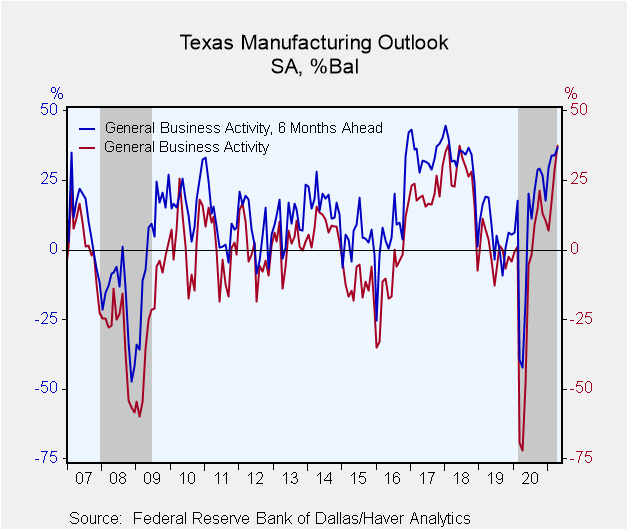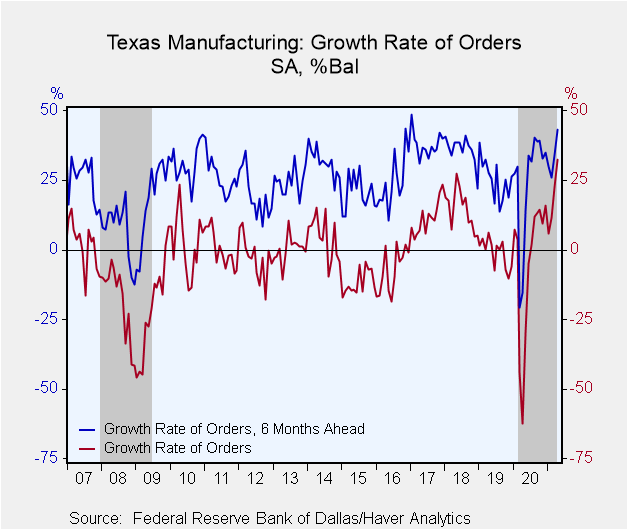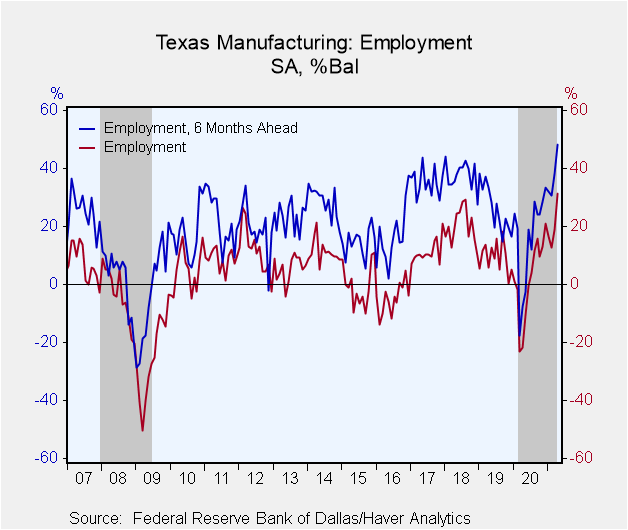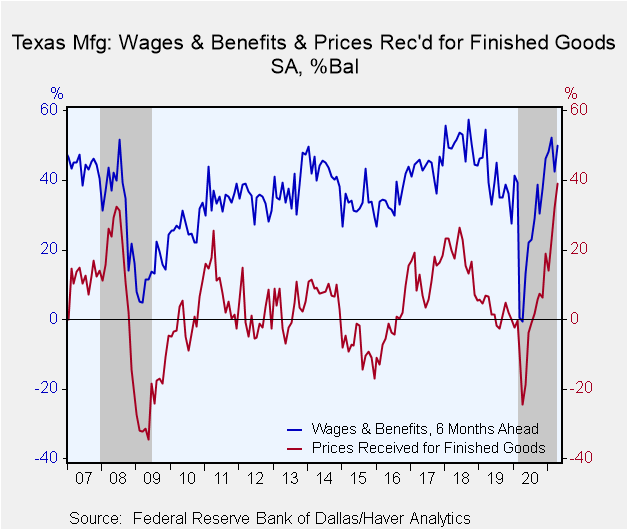 Global| Apr 26 2021
Global| Apr 26 2021Texas Manufacturing Activity & Expectations Improve During April
by:Tom Moeller
|in:Economy in Brief
Summary
• New orders growth & employment remain on rising trend. • Prices received & labor costs also rise. • Expectations strengthen led by new orders growth. Texas manufacturing activity continued to strengthen during April. The Texas [...]
• New orders growth & employment remain on rising trend.
• Prices received & labor costs also rise.
• Expectations strengthen led by new orders growth.
Texas manufacturing activity continued to strengthen during April. The Texas Manufacturing Outlook Survey, conducted by the Federal Reserve Bank of Dallas, indicated that the General Business Activity Index rose to 37.3 this month from 28.9 in March. It was the highest level since June 2018. Forty-six percent of respondents reported improved business activity, up from 24.0% three months earlier. A lessened nine percent of respondents reported that conditions had worsened. The survey was conducted from April 13-21 amongst 107 employers.
The growth rate of the new orders index surged to a record 32.3% from 22.7%. (The series dates back to June 2004.) A record 41.8% of respondents reported faster new orders growth, up from 6.0% twelve months earlier. The employment index improved to 31.3% from 18.8% as a higher 34.6% of firms reported more hiring. Wages & benefits surged to a record 37.1%. Offsetting these gains, the production index fell to 34.0% and reversed half of its March rise. The shipments measure eased m/m as did unfilled orders, though both readings remained elevated.
The measure of prices received for finished goods rose sharply to a record 39.1% from 32.2%. The April increase reflected 41.3% of respondents reporting higher prices while just 2.2% reported price declines. The index of prices paid for raw materials surged to 71.4%, also a record and up from price deflation twelve months earlier. Seventy-four percent of respondents reported higher prices.
The headline index of expectations for overall business activity in six months improved to 36.6% after easing to 33.7% in March. The expected employment measure surged to a record high, while expected hours-worked also jumped. Expectations for production improved and expectations for new orders growth surged. Expected wages also rose and remained up versus early last year.
Each index is calculated by subtracting the percentage reporting a decrease from the percentage reporting an increase. When all firms report rising activity, an index will register 100. An index will register -100 when all firms report a decrease. An index will be zero when the number of firms reporting an increase or a decrease is equal. Data for the Texas Manufacturing Outlook can be found in Haver's SURVEYS database.
| Texas Manufacturing Outlook Survey (SA, % Balance) | Apr | Mar | Feb | Apr '20 | 2020 | 2019 | 2018 |
|---|---|---|---|---|---|---|---|
| Current General Business Activity Index | 37.3 | 28.9 | 17.2 | -72.2 | -10.6 | -1.2 | 25.8 |
| Production | 34.0 | 48.0 | 19.9 | -54.9 | 3.7 | 8.9 | 21.4 |
| Growth Rate of New Orders | 32.3 | 22.7 | 11.6 | -62.4 | -5.3 | -1.1 | 14.8 |
| Employment | 31.3 | 18.8 | 12.7 | -21.8 | 1.6 | 9.5 | 20.0 |
| Wages & Benefits | 37.1 | 28.0 | 16.1 | -3.3 | 11.5 | 23.5 | 29.7 |
| Prices Received for Finished Goods | 39.1 | 32.2 | 23.0 | -24.5 | -1.7 | 2.5 | 17.6 |
| General Business Activity Index Expected in Six Months | 36.6 | 33.7 | 33.9 | -42.5 | 6.6 | 6.4 | 31.6 |
| Production | 47.2 | 38.3 | 40.2 | -12.9 | 31.3 | 35.6 | 48.6 |
| Growth Rate of New Orders | 43.2 | 34.0 | 25.8 | -15.4 | 23.9 | 25.2 | 35.8 |
| Employment | 48.2 | 38.4 | 30.8 | -7.7 | 15.5 | 26.0 | 37.7 |
| Wages & Benefits | 49.9 | 42.4 | 52.1 | -0.6 | 26.7 | 39.7 | 50.4 |
Tom Moeller
AuthorMore in Author Profile »Prior to joining Haver Analytics in 2000, Mr. Moeller worked as the Economist at Chancellor Capital Management from 1985 to 1999. There, he developed comprehensive economic forecasts and interpreted economic data for equity and fixed income portfolio managers. Also at Chancellor, Mr. Moeller worked as an equity analyst and was responsible for researching and rating companies in the economically sensitive automobile and housing industries for investment in Chancellor’s equity portfolio. Prior to joining Chancellor, Mr. Moeller was an Economist at Citibank from 1979 to 1984. He also analyzed pricing behavior in the metals industry for the Council on Wage and Price Stability in Washington, D.C. In 1999, Mr. Moeller received the award for most accurate forecast from the Forecasters' Club of New York. From 1990 to 1992 he was President of the New York Association for Business Economists. Mr. Moeller earned an M.B.A. in Finance from Fordham University, where he graduated in 1987. He holds a Bachelor of Arts in Economics from George Washington University.
More Economy in Brief
 Global| Feb 05 2026
Global| Feb 05 2026Charts of the Week: Balanced Policy, Resilient Data and AI Narratives
by:Andrew Cates










